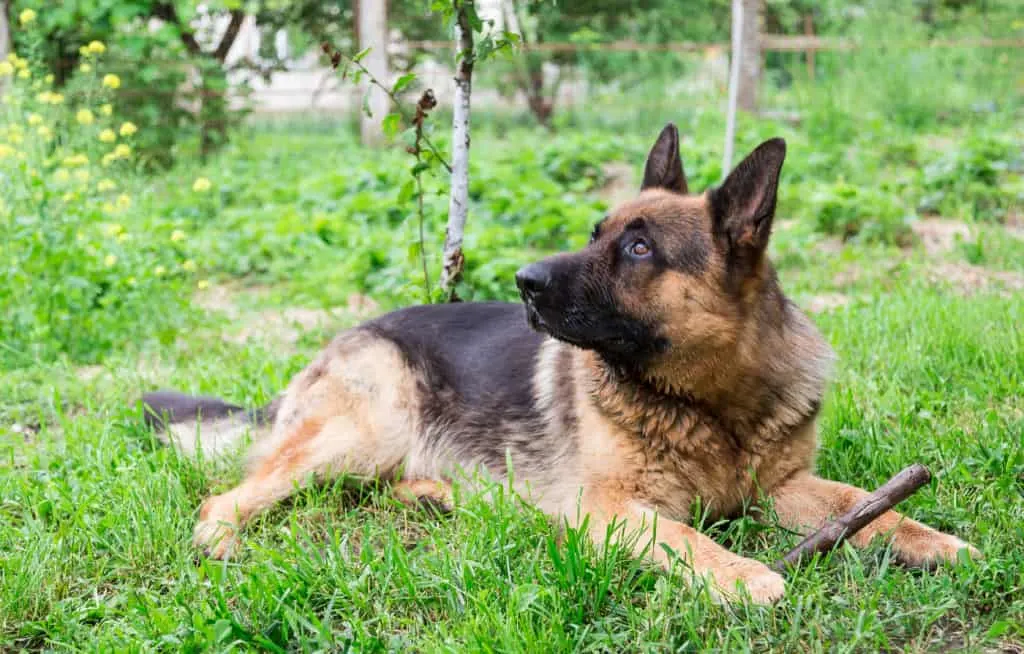
Cancer is responsible for being the number one cause of death in dogs nationwide. According to statistics by the American Veterinary Medical Association, more than 27 million dogs are diagnosed with cancer each year.
Compared to other breeds, German Shepherds have a higher probability of developing cancer at some point in their lives. This probability increases after the age of 10, and approximately 50% of German Shepherds over the age of 10 will die of cancer.
In this article, we will take a closer look at just what cancer in dogs is, and how you can take steps to prevent your German Shepherd from getting cancer in the first place.
Click Here to Jump to a Section
What Is Cancer?
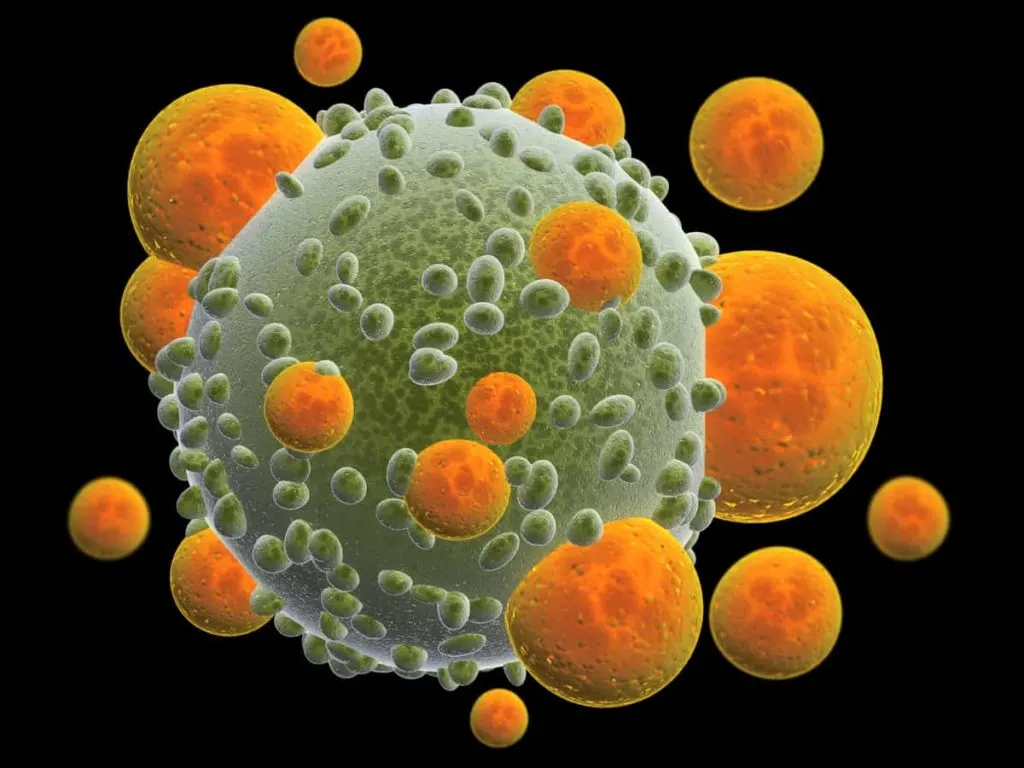
Cancer is a process where the body’s immune system is unable to prevent cancer cells from replicating at an abnormally fast rate.
A dog’s normal cells grow and divide in a controlled way, and this keeps its body healthy. When cells become old or damaged, they die off and are then replaced with new, healthy cells.
However, sometimes this process goes wrong, causing cells to mutate and not die when they should and new cells that a dog’s body does not need are then formed. These abnormal cells divide without control and then go on to invade other tissues.
The cells can then spread to other parts of the body through the bloodstream and lymphatic systems. The result is that a mass of tissue is formed which is referred to as cancer or a tumor.
What Causes Cancer?

There is no single factor that causes cancer. Environmental factors such as exposure to toxins like smog, herbicides, and insecticides can be a cause.
Vaccines have been implicated, and genetics can also play a role in the development of cancer, as can a wide variety of other toxins, radiation, viruses, and hormones.
Food that contains chemical additives and preservatives has also been known to cause cancer in dogs.
Also, if a dog has an immune system that is deficient or suppressed, then this can increase the dog’s risk of developing cancer.
What Are the Signs of Cancer in a German Shepherd?
Abnormal Swelling: One potential cancerous sign is an abnormal swelling, such as a mass, lump, or bump that has started growing under a dog’s skin.
It’s important that if you notice anything that resembles this that you take action instead of just watching the growth to see if it goes away.
Inform your veterinarian, and chances are that he or she will want to remove and biopsy the growth. It’s possible that the growth is harmless, but if it is in fact malignant or cancerous, your prompt action will likely allow for a course of action that can remedy the issue.
Persistent Sores: When a dog gets a wound that causes the skin to break, it will usually heal on its own without any need for treatment outside of a topical antibiotic.
However, if you notice that your dog has a sore or wound that does not seem to go away, this could be a sign of cancer and you again should not hesitate to act and contact your veterinarian if you notice this.
Losing Weight and Loss of Appetite: If your dog is not on a specific weight loss diet and keeps losing weight, take notice. Sometimes this can be caused by a cancerous tumor growing along the dog’s intestine
If this is the case, that there is a tumor growth along your dog’s intestine, then it may also present itself as your dog not wanting to eat at all.
This will occur because the growth actually pushes on the intestines and causes a dog to feel physically ill and therefore have no interest in food.
Difficulty Swallowing: A tumor can grow in many places within the body, and sometimes one will take hold along a dog’s neck. If this happens, it will cause pressure to be placed on the esophagus, causing the dog to have a difficult time swallowing his food.
Bleeding from the Nose: It is not uncommon for a dog to bleed from her nose if there has been some prior trauma like unintended contact with a closing door or a fight with another dog.
In the case that there has been no prior trauma to the area and a dog is bleeding from the nose, this can be a sign of cancer of the nose.
Strong and Offensive Odor: Often times when there is an offensive odor emanating from a dog, we think that it must have something to do with the dog’s diet.
While this can sometimes be the case, a strong odor may sometimes also be caused by a cancerous mass located near the anus.
If there has been no change in your dog’s diet and you notice a new and unusual unpleasant odor, you should inform your veterinarian and allow them to dictate the next steps.
They will likely suggest that you bring your dog in to see them for a closer examination.
Not Wanting to Exercise and Loss of Stamina: This can be caused by a tumor on the heart. Reluctance to exercise may occur due to the excessive pressure that a tumor can place on a dog’s heart. This will cause the heart to strain even in order to perform its basic function.
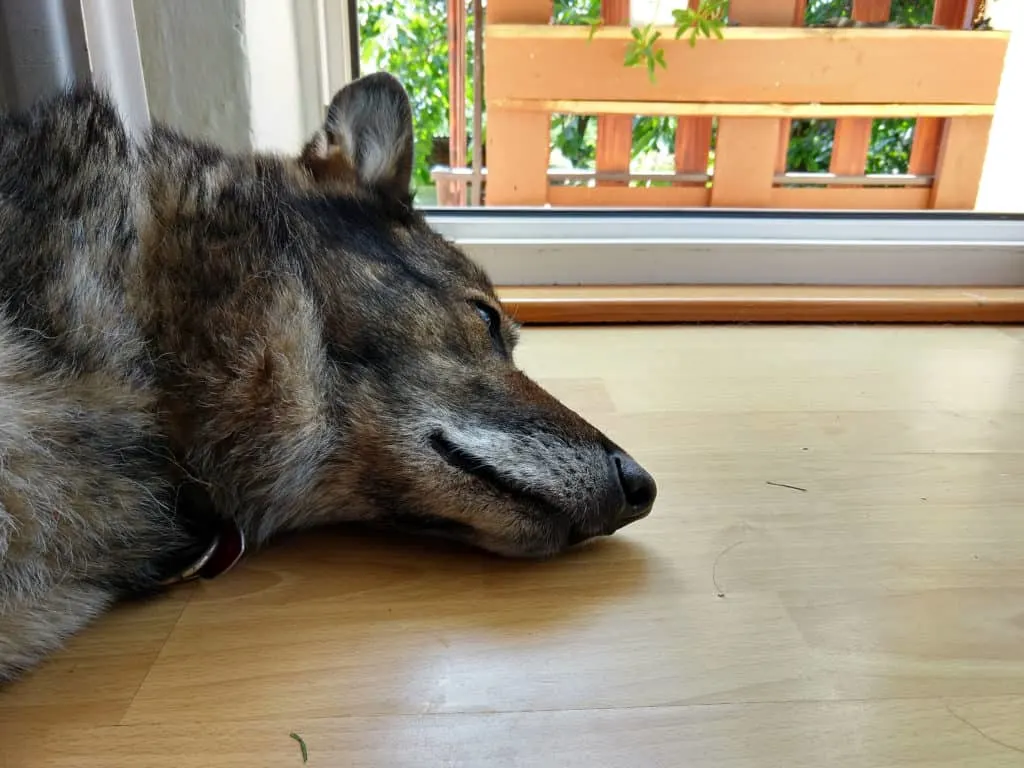
When a dog’s heart is already under strain to function normally, exercise will be difficult for a dog and because of this, they will either be reluctant to exercise or may tire out much more easily than normal.
Ongoing Stiffness: This often coincides with a dog aging. As a dog gets older, just like humans, they are just not as limber as they once were. However, if you notice this in a younger dog, or if it seems excessive in an older dog, this could be a sign of bone cancer. Swelling along a dog’s leg may also accompany the stiffness.
Trouble Breathing, Urinating, or Pooping: Sometimes a cancerous mass can put pressure on an entire physiological system of a dog like the respiratory, urinary, or digestive system.
This pressure will make it difficult for the system to function properly and will present itself as a dog straining to perform any of the above functions.
Bloating: A swollen stomach may be an indication of a buildup of fluids. The fluid buildup can be caused by a tumor located in the gastrointestinal tract fo a dog.
Increased Water Intake and Increased Urination: This can sometimes be caused by a slowly progressive tumor of the hypothalamus or adrenal gland.
If your dog has not been getting the amount of exercise to warrant increased drinking and therefore increased urination, take notice and contact your veterinarian.
What Types of Cancer Are German Shepherds Most Prone To?
Skin: Skin tumors are more common in older dogs than younger ones. They are most often not reason for concern in an older dog, but you need to let your veterinarian make that determination and have your dog checked out if you notice one.
Breast (Mammary Gland): About half of all breast tumors found in dogs turn out to be cancerous. So if you notice an abnormal lump, do not take any chances, and be sure to contact your veterinarian.
Head and Neck: This type of cancer can occur anywhere within the head and neck of a dog. It can present itself in the following ways:
- oral tumors
- mast cell tumors
- tumors from other parts of the dog’s body which have then spread.
Watch for bleeding from the nose, swelling in the face, or gums, as this may be an indication of cancer which has originated from or spread to a dog’s head and/or neck.
Lymphoma: This is a general term that veterinarians use to describe cancers that stem from the lymphocytes.
Lymphocytes are white blood cells that assist a dog’s immune system in fighting off infections. They are mostly concentrated in a dog’s spleen, lymph nodes, and bone marrow.
While there are more than two dozen different types of lymphoma, 4 of these types present the most concern for GSD owners.
- Multicentric lymphoma: This is the most common type of lymphoma, and it directly affects the lymph nodes.
- Alimentary lymphoma: Second in line to multicentric lymphoma, this variety targets a dog’s intestines.
- Mediastinal lymphoma: This is rare, and it affects the thymus and mediastinal lymph nodes in the chest area and causes them to become enlarged.
- Extranodal lymphoma: This type of lymphoma targets specific organs in a dog like the eyes, skin, lungs, kidneys as well as the central nervous system as a whole.
Testicular: This is the most common type of cancer found in male dogs. Here, tumors can grow in either or both testicles. It most often occurs in older male dogs.
There are 3 main types of testicular cancer:
- Seminoma
- Leydig
- Sertoli cell tumor
These 3 types of testicular cancer can all occur in one testicle, or both testicles may be cancerous yet carry different types of these 3 within them.
Bone: This type of cancer is most often seen in large breed dogs like German Shepherds. With bone cancer, also known as osteosarcoma, tumors grow from the inside of the bone outward.
Is There Any Way to Prevent Cancer in German Shepherds?
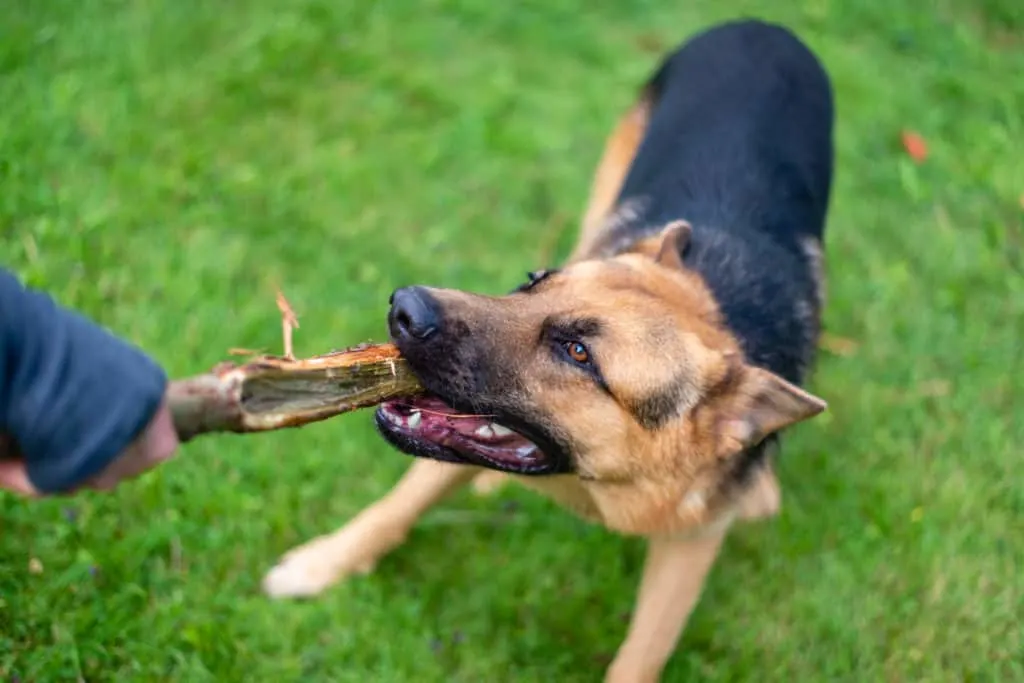
While cancer in a dog may come about for many different reasons, and a lot of those reasons being unknown, veterinary medicine has identified a number of actions that you can actively take to prevent your dog from getting cancer.
Avoid Pesticides: Avoid using pesticides such as mosquito repellent or topical flea and tick medications on your dog if at all possible.
Avoid toxic lawn care products: Do not use toxic lawn care products, and avoid getting your lawn chemically treated. These toxins will adhere to your dog’s paws and fur and will be ingested as your dog grooms himself with his tongue.
Use only non-toxic cleaners: Clean your house with only non-toxic cleaners. When your dog walks over a chemically cleaned floor, toxins will stick to his paws. Your dog will then lick as a part of his natural grooming process and ingest the toxins used to clean the floor.
Vaccinate selectively: Vaccinate for what only is absolutely necessary – meaning only vaccinate for diseases that your dog is likely to get if not vaccinated. The necessary vaccinations for a dog are:
- canine parvovirus
- distemper
- canine hepatitis
- rabies
Vaccines stimulate a dog’s immune system consistently, and this can bring on unintended and undesirable effects especially in older dogs and dogs more susceptible to cancer like German Shepherds.
Exercise: Give your dog regular exercise, as it works to maintain a lower and healthy body weight as well as releasing stress-reducing hormones. Regular exercise can go a long way toward preventing cancer. For a German Shepherd, regular exercise is at least 30 minutes, preferably twice per day.
Nutrition: This is the most important aspect of cancer prevention for your GSD. Nutrition is the foundation for your dog building healthy cells and repairing damaged ones. The best way to accomplish proper nutrition for your German Shepherd is by feeding it a holistic diet.
Make sure that your dog’s diet includes:
- Omega 3 fatty acids
- Probiotics
- Antioxidants
Take a look at this post for guidance on feeding your German Shepherd a healthy holistic diet.
What Is the Treatment for Cancer in a German Shepherd?
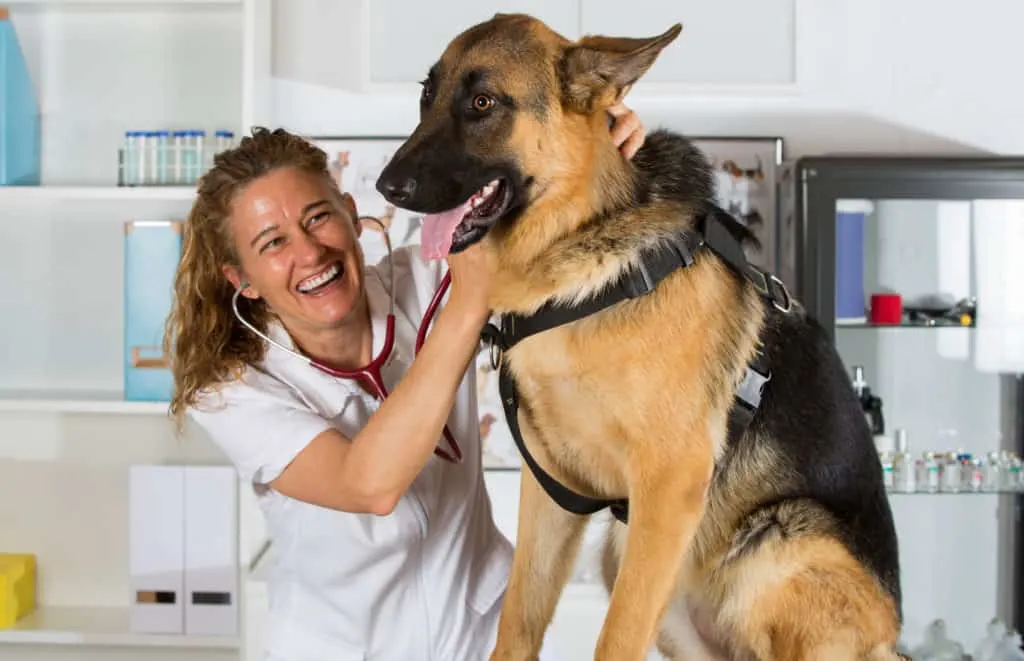
There are 3 main treatment currently being used to treat cancer in dogs – surgery, radiation, and chemotherapy. The type of treatment used is very dependent on the type of tumor that is present in a dog.
- Surgery: This is an option if the cancerous tumor needs to be cut out, and it is also used when an unfortunate dog requires a limb to be amputated.
- Radiation therapy: This renders cancer cells unable to reproduce, and is traditionally done every day for about 3-4 weeks.
The methodology behind this course of treatment is called “curative intent.” The goal with radiation therapy is to try and control the tumor long-term.
Within the curative intent approach is stereotactic radiation therapy. Here, the treatment is very targeted and a higher dose of radiation is used. Because it is targeted, it spares tissues surrounding a tumor.
There is an alternative to curative intent called “palliative intent.” This course of treatment is not as aggressive as that with curative intent, as it employs a fewer number of treatments.
This approach is used when the cancer has spread beyond long-term control and the goal is to simply keep the dog comfortable and out of pain. - Chemotherapy: Unlike radiation therapy, chemotherapy is not targeted to a specific area but instead it treats the entire body. Because it treats a larger area, it is most often used for tumors that have metastasized, or spread, throughout the dog’s body.
Final Thoughts
While none of us wants to think of the day that we will have to say goodbye to our furry best friends, we all know that this day will come. Cancer is a heartwrenching disease for both humans and our canine companions alike, but thankfully we are able to take affirmative steps to lessen the likelihood that our dogs will have to deal with it.
Be aware of what you feed your dog, the substances that she may come into contact with, as well as the products that you use around your home. By being conscious of these things you can be sure that you have done your part to prevent your German Shepherd from ever having to face cancer.
